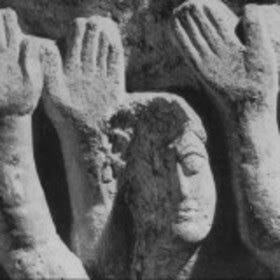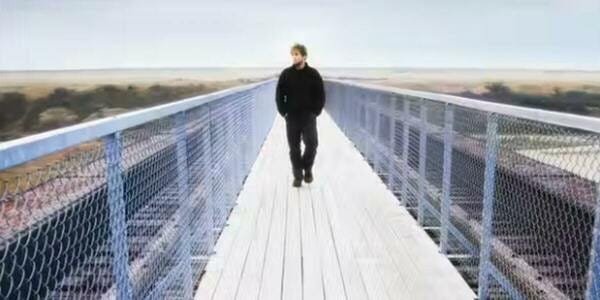The Lectio Letter - Issue #47 - What is "Kingdom" work?
“There’s not a square inch in the whole domain of human existence over which Christ, who is Lord over all, does not exclaim, ‘Mine’!”
– Abraham Kuyper
Well friends, it has been a little while since the last Lectio, I apologise, but as you see in the status board below, things have been busy. Thanks for your patience…
Welcome to Issue #47 of the Lectio Letter. This members-only newsletter is filled with music, film and food suggestions, links, and an article written by yours truly.
As a member, you get access to all the previous issue’s even if you only just signed up recently. Click on a previous issue and then follow the ‘already a member’ link and it will email it straight to your inbox!
Status Board
We’ve landed back in South Africa and have been enjoying our home with a newly renovated kitchen. What a blessing!
We couldn’t be more proud and grateful that our very own Isithembiso Skills project built and managed this renovation. What an achievement!
We’ve been able to be back in Masi and here’s a rare snap of Rachel in the wild’s ;)
We’ve been catching up with our neighbours, a particular highlight was hosting our first every murder mystery (which was postponed from December for Rachel’s Birthday).
We’ve been taking some (increasingly winter) walks with Lowen and our friends dog that we are dog sitting. The colours this time of year are amazing. We’re grateful to live in this place.
I’ve also been flat out working on creating a curriculum for module five of the M.A. programme we work with. It’s all about Kingdom and Vocation. You’ll see the article today was inspired by some reading I’ve been doing for that. Just to prove it, I’ve included a photo of my well-organised (not) desk… ;)
Last week, the students listened to this conversation with NT Wright that some of you might enjoy.
#1 Qs on Heaven, the Kingdom of God and the return of Christ — Ask NT Wright Anything — Overcast
In the first full episode of the show, Tom Wright answers listener questions on how to teach children about new creation, where our loved ones go after they die…
Reading
Kingdom Conspiracy is a fantastic but not un-controversial book which I’ve mentioned in the article this time. McKnight argues there are biblical definitions for what constitutes “Kingdom come” and much of our use of that word is, well, wrong.
Food
Ottolenghi’s Za'tar Roast Chicken Thighs
We wanted a Mediterranean flavoured easy chicken recipe and made this to great acclaim a few nights ago!
Ingredients
8 chicken thighs with skin and bones.
2 red onions, thinly sliced
1 lemon, thinly sliced
2 large cloves of garlic, crushed
5 tbsp olive oil, divided
2 tablespoon za'atar plus more to taste
1 tablespoon sumac
1 teaspoon ground cinnamon
250 ml chicken broth
1 ½ teaspoon salt, plus more to taste
½ teaspoon freshly ground black pepper, plus more to taste
Topping:
6 tablespoon pine nuts
15 grams chopped flat-leaf parsley
Instructions
In a large bowl, mix chicken, onions, lemon, garlic, 4 tablespoons olive oil, spices, broth, salt, and pepper. Marinate in the fridge for at least 3 hours or overnight.
Preheat oven to 400°F. Transfer chicken and its marinade to a shallow baking pan large enough to hold all the chicken pieces lying flat with a little space between pieces. Chicken should be skin side up. Roast for 35 to 40 minutes, until just cooked through.* If you like the skin browned, turn the oven up to broil for the last few minutes of cooking, checking every minute or so until the skin is as crisp and brown as you like it. (Be very careful not to burn it)
Make The Topping: While the chicken is roasting, line a plate with a double layer of paper towels. Heat the remaining tablespoon of oil in a small frying pan over medium heat. Add the pine nuts and cook, stirring constantly, until they turn golden. Transfer to paper-towel-lined plate, to absorb the oil.
To Serve: Transfer the hot chicken, onions and lemons to a serving platter. Pour pan juices over the chicken pieces. Sprinkle chicken with extra za'atar if you like and sprinkle with chopped parsley and toasted pine nuts. Serve hot.
Music
Recently, and we were back in London we were able to visit Kings Cross Church. Afterwards, I looked through some of their worship recordings and really enjoyed this song; With me by Rich and Lydia diCas.
With Me (David's Song) [Live] | KXC
This was a favourite tune from our road trips in the UK, Nick Mulvey, A Prayer Of My Own.
Nick Mulvey - A Prayer Of My Own (Official Lyric Video)
This short guitar instrumental hits all the right tonal qualities for me.
Cerca De Ti
Finally the Spotify algorithms directed me towards this project called versus where worship musicians create songs from particular versus. This was the first one I heard and so far my favourite too.
John 13:34-35 (feat. Paul Zach & Jessica Fox)
What is "Kingdom" Work?
For much of Christian history, a sacred/secular divide was set up through the teachings of a fourth-century bishop Eusebius of Caesarea. He argued that there were two different types of calling in the world. The “perfect” life was a life given to church work, monastic life, to a priestly vocation. The “permitted” life was everything else, the task of making the world work. You might be a farmer, a mother, or a baker but that was only permitted, the perfect life was life in devoted service to Jesus.
In some sections of the church and maybe, at a subconscious level, for more of us than we’d like to admit, this distinction lingers on. Many of the conversations I’ve had with people about our work here in South Africa have often ended up revealing this divide. What is meaningful work? We have often attempted to allay the vocational anxiety of people we know doing what they perceive to be ‘less legitimate’ work than the work we do.
But all work has the aspect of the mundane, while some might imagine those of us in full-time ministry roll out of bed every morning glowing with purpose and a sense of meaning, the reality is that every job can become just that, a job. By saying that, I don’t want to downplay that our calling here has been deeply rewarding and a privilege, but some days you are just engaged in the kind of maintenance mode activities as everyone else, wondering, does this matter, does this count?
Over 500 years ago, the protestant reformation transformed Eusebius’ definition of the perfect life. The reformers were captivated by God’s activity in all the world, not just in the hallowed hall of religious institutions. The argument went that farming, mothering and shopkeeping could be as hallowed as any holy order you might seek to join. The reformers affirmed that those living with worshipful hearts to God in their work, those who contributed to the common flourishing of humanity towards the goal of God’s kingdom could enjoy the same dignity in their work as any bishop.
There has been somewhat of a revival of this faith and work movement in the last 20 or so years. Christian writers and pastors have recognised that the majority of their congregants are looking for a sense of meaning and integration between what they do Monday to Saturday and their worshipping life in the Church on a Sunday. It’s not enough to encourage church participation and programs but to equip the people of God, for the work of God in the spheres of society they spend their weeks.
Returning to Genesis for a moment, we see God create the context of creation as potential, not perfection (which I’ve written about previously), and in this context, God places image bearers to work, keep and cultivate this creation. They are to take this creation somewhere, to increase the beauty, order and abundance that God has placed in creation.
Fast-forwarding to followers of Jesus now, we see Jesus reclaims the call given to Adam and breathes his resurrection power on his followers by the Spirit. He restores our call to be faithful image-bearers with the dual call to proclaim this good news that God has begun the work of restoration and to call us into that work.
Therefore, I have argued, that wherever followers of Jesus put their hands to work in the world to see the increase of beauty, order and abundance then that work is work which anticipates the new creation and has an inheritance in it.
Something of a rift in the church has appeared in these two callings though. Some argue that the emphasis is on the proclamation of God’s kingdom in words; evangelism, power ministry etc. While another group argues that proclaiming God’s kingdom is done through action; working for justice, equality and the like. Most in each group would affirm the importance of some form of both of these, but the key issue is emphasis and energy. Where to place and spend it.
The weakest forms of both of these emphases are plain to see. Proclaimers see the world as going to hell in a handbasket and call people to repent, believe and be saved to heaven upon their death. Justice workers do good works in the world but tend to downplay the societally embarrassing claims of Jesus as they do it if they don’t drift away from orthodox faith entirely.
Here, Scot McKnight, a New Testament professor at Northern Seminary enters the fray. He wants to place some serious bumps in the road of both of these approaches, and those ‘bumps’, he claims, are the scriptures themselves. What did Jesus mean when he spoke about the Kingdom, what did Paul mean? What did the Israelites and their prophets mean?
While one could argue that Israel before Jesus had misunderstood the kingdom a good bit, as evidenced by Jesus’ pronouncement of judgement on the religious enterprise of his day, at the same time he claims to fulfil not abolish what Jewish people had held to all those years.
McKnight after examining the New and Old Testament, as well as Josephus and the Dead Sea scrolls argues that there are 5 irreducible elements to a biblical definition of Kingdom;
1. A King: A Kingdom needs to have a king.
2. A Rule: The King needs to rule, by redeeming them into his rule from slavery (salvation) and governing them (Lordship).
3. A People: The King has a people
4. A Will: In biblical terms, this is seen in the Old Testament when God gives the 10 commandments as his intention for how to live, and in the New Testament in the sermon on the mount and the teachings of Paul on how to live in the Christian community.
5. A Land: This is a clear connection in the Old Testament, that the people of God need a land where they can dwell with God as in the garden. It is seen in the tabernacle, and then the temple, then in Jesus
McKnight argues that we need to take our use of the word Kingdom and put it through these 5 tests.
Much of what we might like to call Kingdom, he goes on to argue, may end up appearing to be more like what New Testament writers call “good works”. Good things are done by good people for the sake of the common good, but if these elements above are not present he doesn’t think it passes the test for being called Kingdom work.
What I think is helpful here is that when Christians, as I have, move into the world to pursue goodness and justice for the sake of the ‘least’, there can quickly become a disconnect. What starts out as a gospel-motivated pursuit for goodness (on earth as it is in heaven, so to speak), becomes flattened. Our aim, goals and values become stand-alone, we do good for goodness sake without recognising that;
a) Only God is good and that kind of goodness must break into earth from heaven not simply from earth.
b) Goodness is defined by, is rooted in and encompassed by God’s very self
When we subtly disconnect the aims, goals and values of our work from God, he ceases to, in practical terms, be Lord over them. We can ‘take the land’ as it were, but the King is conspicuously absent.
While the reformation restored value for ‘this world’ it also opened the door to forgetting heaven. Our language about “on earth as it is in heaven” can become flattened and our worldly efforts become just that, a flattened attempt at utopia without the need for God.
The new Jerusalem where God dwells with his people, wrongs are finally put right and there is no more suffering is not a bottom-up project. The New Jerusalem descends from heaven (Rev 21:2,10) and is an accomplishment of the risen, conquering lamb not our work.
So while our work in the world testifies to, foreshadows and anticipates God’s kingdom come, our worship reminds us that in order for the world to be made new, for God’s Kingdom to fully come we need the King on his throne, in the land, with his people under his rule and reign.
Miscellaneous Link List
For the last couple of years I have so enjoyed writing and speaking of Andy Crouch who is consistently insightful and opens up new ways to think about things in our world in a distinctly Christian way.
His most recent work has mostly been around technology and this latest book which the links below familiarise you with has just come out and I am looking forward to reading it.
PODCAST: ‘The Life We’re Looking For,’ with Andy Crouch — Mere Fidelity — Overcast
Andy Crouch brings a much-needed Christian perspective to understanding how humans relate to technology in his new book, The Life We’re Looking For. Do you know the connection between our basic need for recognition and our dependence on screens? What can we do to make our world more humanized? And when will we be able to achieve it? Derek, Alastair, and Matt discuss these questions and more with Andy in this high energy conversation. Full show notes at www.merefidelity.com.
REVIEW: Can We Be Human in Meatspace? — The New Atlantis
A new book asks whether revolution against tech starts at home.
www.thenewatlantis.com • Share
…listen to a Silicon Valley mogul talk about the newest invention or cutting-edge research. It is a dismal menu of options: the fantastical (immortality, uploading your consciousness to the cloud), the terrifying (digital surveillance, sentient robots), the shallow (streaming videos, the metaverse), the banal (smart thermostats, voice assistants), and the meaningless (“greater connection,” “enhanced creativity”). The last category alone is damning. We are meant to be connected and creative. Connected how? Creative to what end? A terrorist cell is deeply connected and highly creative. So is a local chapter of the Klan. Indeed, such groups are often among tech’s early adopters.
FURTHER COMMENTS: Andy Crouch on invitation and repair – Snakes and Ladders
To rebuild households would begin to undermine Mammon itself. If we lived this way together, we would begin to fundamentally change our economy in the most literal sense and eventually change the structure of economic life more broadly — what we value, measure, and reward. To begin this kind of economic restoration does not require us to change the practices of Wall Street, the Federal Reserve, or the European Central Bank — or even to know, exactly, what ought to replace them. We just (just!) have to redirect our energies away from Mammon’s domain and turn toward a realm where Mammon has nothing to offer. And then we need to invite others to join us under that new shelter.
The French town where the lighting is alive - BBC Future
From deep-sea fish to fireflies, dozens of organisms use bioluminescence to help themselves be seen in the natural world. But can we harness them to light our towns and cities?
The 9 Biggest Myths About Nonfiction Trade Publishing, Debunked
What really happens when you “get a book deal,” publish your first book, and go on tour to promote it? It may not be what you’ve always imagined!
summerbrennan.substack.com • Share
On Leaving the Faith - by Scot McKnight - Scot’s Newsletter
Why do people walk away from the Christian faith? Call it what you want — apostasy or deconversion, the question for us today is Why? Is there a bottom line or a core reason, or does it differ so much from person to person that we have to answer “For many reasons”?
scotmcknight.substack.com • Share
Tim Keller’s Reading List
I am such a sucker for reading lists! So I couldn’t help myself when such a thoughtful person is Tim Keller was sharing his recently. The interaction is a little jarring with his wife we have to admit here! But when smart people tell you what they’re reading, even if you don’t go onto read it their comments are insightful and illuminating! And so it is with the video below.
Tim Keller's Recommended Reading from the Pandemic
The next article is incredibly well written and achingly insightful, but it is not short. For those of you with the courage to read it, I trust it will bless you as it did me.
When Belief is Agony - Mere Orthodoxy | Christianity, Politics, and Culture
I love being a Christian. I mean, I love Jesus too. But I also love all the rest of it: Brunch after church with friends, hylomorphism, late-night Eucharist on Christmas Eve, and carols and stollen and roast beef and friends’ […]
Sharing is Caring
As ever, If you think this or any previous articles would be interesting or useful to those you know, please feel free to forward this email and encourage them to sign up too.
As a member, you get access to all the previous 46 issue’s even if you only just signed up recently. Click on a previous issue and then follow the ‘already a member’ link and it will email it straight to your inbox!
That’s all for now!
Liam










![With Me (David's Song) [Live] | KXC With Me (David's Song) [Live] | KXC](https://substackcdn.com/image/fetch/$s_!zlea!,w_1456,c_limit,f_auto,q_auto:good,fl_progressive:steep/https%3A%2F%2Fsubstack-post-media.s3.amazonaws.com%2Fpublic%2Fimages%2F836d20e2-1b35-4cd4-bcfc-d36538d15e28_600x450.jpeg)












